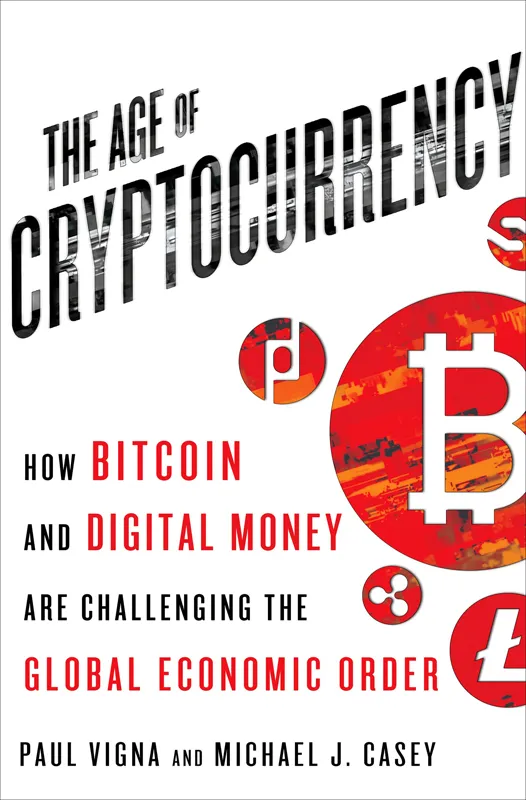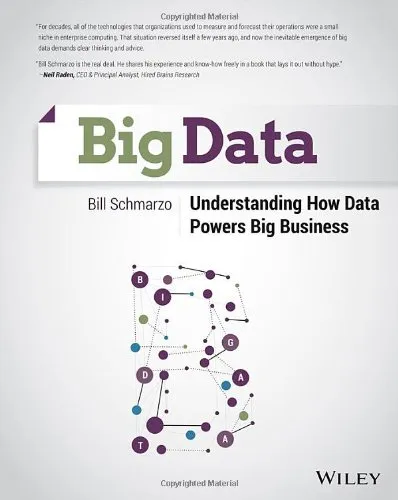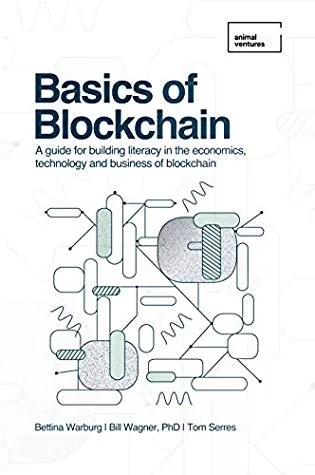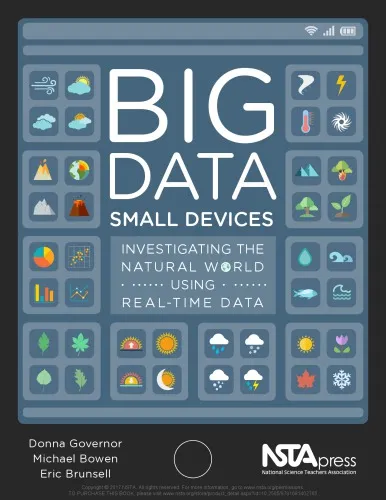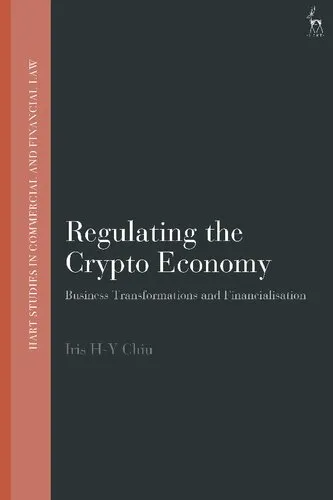The age of cryptocurrency: how bitcoin and digital money are challenging the global economic order
4.0
بر اساس نظر کاربران

شما میتونید سوالاتتون در باره کتاب رو از هوش مصنوعیش بعد از ورود بپرسید
هر دانلود یا پرسش از هوش مصنوعی 2 امتیاز لازم دارد، برای بدست آوردن امتیاز رایگان، به صفحه ی راهنمای امتیازات سر بزنید و یک سری کار ارزشمند انجام بدینکتاب های مرتبط:
معرفی کتاب "The Age of Cryptocurrency: How Bitcoin and Digital Money Are Challenging the Global Economic Order"
کتاب "The Age of Cryptocurrency" نوشته پاول وینیگا و مایکل جی. کیسی به بررسی گستردهای از جهان Bitcoin، فناوری Blockchain، و تاثیر اقتصادی و اجتماعی آن بر نظامهای مالی سنتی میپردازد. اگرچه Bitcoin در زمان پیدایش خود فقط یک ایده نوآورانه بود، اما اکنون تبدیل به یک نیروی اقتصادی بزرگ و یک انقلاب دیجیتال واقعی شده است.
این کتاب در عین حال که نگاه عمیقی به تاریخچه و اصول این فناوری دارد، همچنین جنبههای آیندهاندیشانه و مشکلات احتمالی آن را پوشش میدهد. نویسندگان با زبانی جذاب و سبک نگارش روان، تمامی جنبههای تکنولوژیکی، اجتماعی، و سیاسی ارزهای دیجیتال را توضیح میدهند، به طوری که خوانندگان، اعم از مبتدی و متخصص، به راحتی میتوانند از محتوای آن بهرهمند شوند.
خلاصه دقیق کتاب
کتاب با روایتی جذاب از ماجرای پیدایش Bitcoin آغاز میشود، که توسط فرد یا گروهی ناشناس با نام مستعار Satoshi Nakamoto توسعه یافت. این فناوری راهی برای انتقال ارزش به صورت کاملاً غیرمتمرکز و بینیاز از بانکها و واسطهها ارائه کرد.
در فصلهای ابتدایی، کتاب به بررسی اصول فناوری Blockchain میپردازد که سنگ بنای Bitcoin بهشمار میآید. نویسندگان مسئله اعتماد در اقتصاد دیجیتال را تحلیل کرده و به طور مفصل توضیح میدهند که چگونه اعتماد از بانکها به کدهای کامپیوتری منتقل شده است.
در ادامه، کتاب به بررسی کارکردهای اقتصادی و اجتماعی Bitcoin میپردازد. از کاربردهای پایه نظیر راههای پرداخت جهانی بدون مرز گرفته تا نقش آن در جوامع با اقتصادهای ناپایدار، مانند ونزوئلا.
از دیدگاه نویسندگان، Bitcoin فقط یک ارز دیجیتال نیست، بلکه نوعی ابزار قدرتبخشی به افراد و کاهش وابستگی به نظامهای مالی سنتی است. این ایده که اقتصاد میتواند بدون نظارت مرکزی عمل کند، یکی از مسائلی است که در این کتاب عمیقاً مورد تحلیل قرار گرفته است.
نکات کلیدی کتاب
- Bitcoin فقط یک پدیده فناوری نیست؛ بلکه یک تغییر بنیادین در ساختار اقتصادی جهانی است.
- فناوری Blockchain میتواند کاربردهای فراتر از ارزهای دیجیتال داشته باشد، از جمله قراردادهای هوشمند (Smart Contracts) و مدیریت زنجیره تأمین.
- ارزهای دیجیتال، فرصتی برای ارائه خدمات مالی به کسانی هستند که به بانکهای سنتی دسترسی ندارند.
- چالشهای پررنگی همچون نوسانات ارزهای دیجیتال و مسائل قانونی همچنان گریبانگیر این فناوری نوین هستند.
جملات معروف از کتاب
"Bitcoin is not just a currency; it’s a form of trust."
"The blockchain gives people who otherwise wouldn’t trust one another a way to reach agreement."
چرا این کتاب اهمیت دارد؟
کتاب "The Age of Cryptocurrency" نه تنها به افرادی که علاقهمند به فناوری هستند، بلکه به تحلیلگران اقتصادی، سیاستگذاران، و حتی عموم مردم که به دنبال درک تاثیر ارزهای دیجیتال بر جهان مدرن هستند، کمک میکند.
این اثر ابعاد مختلفی از انقلاب دیجیتالی شده در نظامهای مالی را پوشش میدهد و به خواننده نشان میدهد چگونه Bitcoin میتواند اساس دنیای بدون بانکهای مرکزی و سازمانهای مالی بزرگ را بسازد. مطالعه این کتاب برای هر فردی که میخواهد در جریان جدیترین مسائل اقتصاد جهانی و فناوریهای آینده قرار گیرد، ضروری است.
Introduction to "The Age of Cryptocurrency"
"The Age of Cryptocurrency: How Bitcoin and Digital Money Are Challenging the Global Economic Order" is a groundbreaking book by journalists Paul Vigna and Michael J. Casey. It explores the emergence and implications of Bitcoin and other digital currencies, delving deep into how this revolutionary technology is reshaping the economic, social, and cultural fabric of the modern world. Written in a persuasive and accessible style, the book is an essential read for anyone seeking to understand the disruptive force of cryptocurrency and its profound impact on global systems. From the origins of Bitcoin to its implications for global finance, "The Age of Cryptocurrency" provides a comprehensive look at how digital currencies are changing the way we think about and use money.
At its core, the book asks a profound question: Can a technology designed to bypass the traditional financial system succeed in creating an open, decentralized, and equitable financial marketplace? The authors unpack years of research and analysis to provide an insightful narrative about the evolution of Bitcoin, the blockchain, and other cryptocurrencies, offering readers not only a detailed overview of the key concepts but also an exploration of their real-world applications and consequences.
Detailed Summary of the Book
The book begins by placing Bitcoin in the context of the global financial crisis of 2008 and the subsequent erosion of trust in banks and governments. As traditional economic systems wavered, Bitcoin emerged as a radical alternative that promised transparency and decentralization. The authors take readers on a journey through Bitcoin's inception by its pseudonymous creator, Satoshi Nakamoto, and highlight the motivations behind creating a financial system free from intermediaries.
Vigna and Casey skillfully explain the mechanics of blockchain technology and how this immutable ledger underpins Bitcoin, making decentralization and trust possible without a central authority. They debunk many misconceptions about cryptocurrency, offering insights into its security features, mining processes, and peer-to-peer transaction networks. Through case studies, the authors illustrate how Bitcoin has been able to thrive even in geographies marked by economic instability and inflation, such as Zimbabwe and Argentina.
The book is not just a technical guide but a socio-economic analysis. It delves into the philosophical and ideological aspirations behind Bitcoin, exploring how libertarians, technologists, and entrepreneurs view it as a tool for empowerment and financial inclusion. Critically, the authors also shed light on regulatory debates, the black-market controversies tied to Bitcoin, and the rise of altcoins and blockchain applications outside of finance.
Towards the end, the book speculates about where cryptocurrency is heading and what challenges lie ahead. As adoption grows, debates about scalability, governance, regulation, and the environmental footprint of mining intensify. The authors conclude with an optimistic outlook, emphasizing that the rise of cryptocurrency is more than a passing trend—it's a fundamental shift in economic history.
Key Takeaways
- Bitcoin was conceived as a response to the 2008 financial crisis, offering an alternative to the traditional banking system.
- Blockchain technology is the foundational innovation behind cryptocurrencies, enabling trust and transparency without intermediaries.
- Cryptocurrencies represent both technological innovation and ideological shifts in finance, emphasizing decentralization and individual autonomy.
- Despite controversies, cryptocurrencies have already been proven to provide economic solutions in regions with unstable currencies.
- The future of cryptocurrency depends on resolving issues like regulation, scalability, and environmental sustainability.
Famous Quotes from the Book
"Bitcoin is not just a new kind of money; it's a new kind of trust."
"Bitcoin is more of a social movement than a financial innovation. It’s about rebuilding trust among humans."
"The idea of digital scarcity could revolutionize the way we manage assets, identity, and agreements."
Why This Book Matters
"The Age of Cryptocurrency" is a vital resource for anyone who wishes to understand not just Bitcoin and blockchain technology, but the larger financial, political, and social implications of digital currencies. It bridges the gap between technical knowledge and mainstream relevance, making the complex subject of cryptocurrencies approachable and engaging for readers of all backgrounds. Entrepreneurs, policymakers, developers, and curious technophiles alike will find the book to be a valuable guide in navigating the rapidly evolving crypto landscape.
The book anticipates many of today's debates around cryptocurrencies, providing early insight into their potential both to disrupt industries and to drive economic inclusion. As governments and institutions grapple with the implications of digital money, "The Age of Cryptocurrency" serves as an essential primer for understanding the stakes, opportunities, and challenges ahead. With cryptocurrency becoming increasingly intertwined with our broader economic and technological systems, the book’s lessons are more urgent and relevant than ever before.
دانلود رایگان مستقیم
شما میتونید سوالاتتون در باره کتاب رو از هوش مصنوعیش بعد از ورود بپرسید
دسترسی به کتابها از طریق پلتفرمهای قانونی و کتابخانههای عمومی نه تنها از حقوق نویسندگان و ناشران حمایت میکند، بلکه به پایداری فرهنگ کتابخوانی نیز کمک میرساند. پیش از دانلود، لحظهای به بررسی این گزینهها فکر کنید.
این کتاب رو در پلتفرم های دیگه ببینید
WorldCat به شما کمک میکنه تا کتاب ها رو در کتابخانه های سراسر دنیا پیدا کنید
امتیازها، نظرات تخصصی و صحبت ها درباره کتاب را در Goodreads ببینید
کتابهای کمیاب یا دست دوم را در AbeBooks پیدا کنید و بخرید
1386
بازدید4.0
امتیاز0
نظر98%
رضایتنظرات:
4.0
بر اساس 0 نظر کاربران
Questions & Answers
Ask questions about this book or help others by answering
No questions yet. Be the first to ask!
